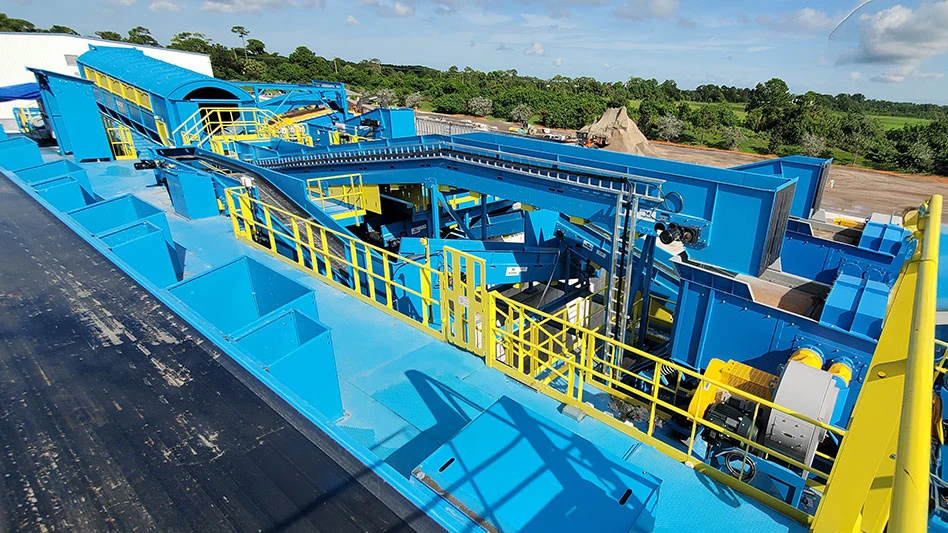
Photo courtesy of Oryx Stainless
Netherlands-based metals recycling company Oryx Stainless, which also has operations in Thailand, says a study it commissioned shows that increased recycling of stainless steel can make a noticeable contribution to mitigate climate change in Thailand and globally.
The study was conducted by Thai and German scientists on behalf of Oryx Stainless (Thailand) Co. Ltd., along with The Fraunhofer Center for International Management and Knowledge Economy IMW from Leipzig, Germany. The effort also was supported by the German Embassy in Thailand.
The study examined the social welfare benefits of recycling stainless steel in Thailand. “For every ton of stainless steel scrap used to produce new stainless steel, 6.71 tons of CO2 are saved compared to the use of primary raw materials,” Oryx says.
Based on the stainless steel scrap handled by Oryx Stainless in Thailand in 2021, used as the reference year in the study, the scientists calculated CO2 savings of 556,000 tons. This approximately corresponds to the annual carbon footprint of the residents of the Muang Chachoengsao district near an Oryx Stainless plant in Thailand.
That emissions tonnage figure also equates to 1.45 percent of the total greenhouse gas (GHG) emissions from all industrial processes in Thailand in 2021, according to the study.
“The potential for Thailand and the climate becomes clear when one sees that almost 3.6 million tons of CO2 were saved within the entire Oryx Stainless Group in the reference year,” the company says.
"This study shows that the smart use of recycling raw materials such as stainless steel scrap and their use in the production of new products can make a tangible contribution to the fight against climate change,” Sirichai Tempoomsuk, chief financial officer (CFO) of Oryx Stainless Thailand, says.
“Stainless steel scrap is a particularly valuable secondary raw material due to its very high recyclability," the CFO continues. "Stainless steel can be recycled without any loss of quality. Worldwide, 95 percent of stainless steel is recycled at the end of its lifespan [and] 70 percent is recycled as stainless steel.
“Scrap currently accounts for around 48 percent of raw materials for stainless steel production worldwide. In Europe, leading stainless steel producers go to the limits of what is technically feasible and use up to 95 percent secondary raw material blends for the production of new stainless steel," Tempoomsuck adds.
Oryx says the effects of climate change are of particular importance to Thailand, with the country ranking ninth in a global long-term climate change risk index calculated by Germany-based think tank Germanwatch.
In terms of the economic savings of recycling, the volume of stainless steel scrap Oryx puts back into the production cycle in Thailand prevented about $52 million of spending on ores and mining, according to the study.
The calculation is based on the two-step “Scrap Bonus” indicator developed by the Fraunhofer Center. In the first step, the environmental impact avoided by using 1 ton of stainless steel scrap in steel production is quantified. In the second step, various economic estimates and price references from emissions trading systems are used to convert the avoided environmental impact into a currency value. “In other words, a price is assigned to the (avoided) pollution,” Oryx says.
Oryx says 7.79 million tons of stainless steel was produced in Asia in 2023 (excluding China and South Korea), with the Association of Southeast Asian Nations (ASEAN) countries, including Malaysia and Indonesia, building up millions of tons of new capacity.
Thailand produced about 366,000 tons of stainless steel in 2022 and is the second-largest consumer of stainless steel in the ASEAN region, the recycling firm says.
“The growth perspective in Southeast Asia and, thus, in Thailand underlines the need for the smart use of our resources in view of the ongoing climate change caused by the emission of greenhouse gases,” says Christian Klöppelt, a research fellow at the Fraunhofer Center.
“This is where politics is needed, also in Thailand," he continues. "Smart recycling creates both economic and environmental benefits for Thai society. To take full advantage of these benefits, policymakers should ensure a level playing field for raw materials and provide favorable operating conditions for the recycling industry.”
The researchers propose a system of pricing tied to CO2 emissions in Thailand. “Additionally, there’s a suggestion to expand the Thai Bio-Circular-Green (BCG) Economy Model to include metal scrap,” they say, recommending creating conducive operating conditions for the recycling industry.
Latest from Recycling Today
- Greenwave raises revenue but loses money in Q2 2025
- Recycled steel prices hold steady
- EY says India’s need for scrap imports will continue
- Coming full circle
- Amcor, DCM introduce fertilizer packaging with 35 percent recycled content
- Comstock Metals gets closer to commissioning commercial-scale solar panel recycling facility
- Washington selects Circular Action Alliance as PRO
- Smurfit Westrock expands in Latin America





